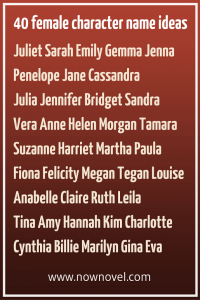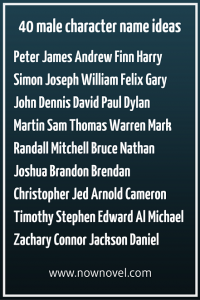Naming characters for a novel or short story is sometimes tricky. Finding fictional character names that suit characters’ personalities or carry apt connotations is rewarding, though. Here are 5 steps to choose a great character name:
Step 1: Think about how each primary character’s name relates to your story
Character names from classic literature teach us useful lessons in how to choose fitting or even clever names for characters. Many of Shakespeare’s plays, for example, contain aptly named characters.
In Twelfth Night, for example, the shipwrecked Viola dresses as a boy to live incognito in the Dukedom of Illyria. The name ‘Viola’ is fitting for multiple reasons. For one, music is a running theme throughout the play (the opening line being ‘If music be the food of love, play on.’) Further, the viola in the string instrument family resembles a violin but is bigger and deeper in range than a violin but smaller and higher than a cello. This in-between character is a good parallel for Viola’s in-between gender performance as she pretends to be male in order to find opportunities that would otherwise be denied to her.
There are many ways your characters’ names can resonate with your story. For example, a character’s name can be:
- Paradoxical or contradictory: A large, gentle giant of a man has the surname ‘Little’
- Descriptive: Names can describe aspects of your characters. For example, the tomboyish ‘Jo’ (short for Josephine) in Louisa May Alcott’s Little Women goes by a truncated name that fits her gender non-conformity
To find a fitting name, think about each character’s arc and any story detail that might supply a fitting or clever name.
Step 2: Make lists of first names and their meanings
Name meanings often supply useful underscoring for character developments. The name ‘Felix’, for example, comes from a Roman cognomen (the third part of a Roman name), meaning ‘lucky’ or ‘successful’. This would be a fitting name, then, for a character whose story arc shows him rising to success with the help of great luck.
Behind the Name is an excellent resource for finding names for your stories that have useful associations.
Additionally, if you want to find a pen name to use as a pseudonym when sharing your fiction, Invaluable has a fun pen name generator here.
Step 3: Think about surname meanings when naming characters
Cultures throughout the world have many fascinating naming traditions. In Sweden, for example, patronymic surnames based on the father’s first name became permanent family names in the 19th Century (for example ‘Karlsson’ or ‘Karl’s Son’).
In England, Germany and other countries, surnames based on professions are also common. Because sons often followed in their fathers’ footsteps professionally, occupational surnames (Smith, Potter, Baker or Hawker) often stuck. A surname can thus suggest your character’s ancestral history. Tom Sawyer in Huck Finn would have come from a woodcutter lineage – a fitting name for a child who spends most of his time adventuring in the outdoors.
Step 4: See how other authors choose names that fit genre and character type
Genre does have some impact on choosing character names. In a category romance, you’re not likely to find a name like fantasy author Tolkien’s creation, ‘Galadriel’. Romance novels typically favour standard names that suggest desirable traits in lovers: Sophistication, strength, beauty, cuteness, and so forth. The diminutive-sounding ‘Allie’ of the female lead of Nicholas Sparks’ The Notebook is one example. In fantasy, names often reflect a character’s tribe or race.
Tolkien, with his background in linguistics, was a master of highlighting his characters’ different backgrounds and group belongings via their names. The British, ‘ordinary’ first and last names of the hobbits from the Shire (‘Sam’; ‘Baggins’) contrast with the more mythical, elevated-sounding names of the wizards, for example (‘Gandalf’; ‘Saruman’).
In literary fiction and theatre, we often find names that give clues to a character’s personality or fate (for example, the masculine Jo March in Little Women).
To find names fitting your genre, rifle through some of your favourite novels and look at the names authors give. Take notes. Are they standard, common names, or more obviously invented? If they seem fitting, why? Apply the insights you gain from this exercise to your own character naming.
Step 5: Use a random element to generate a list of character names
If you’re stuck for good surnames, a public phone directory is a useful, alphabetically arranged source. Open your phone directory to a random page and read whatever name your finger lands on. Make a list of last names that capture your attention.
Besides using physical resources to find names, try using online name generators and combining different results. This name generator lets you choose how many given names to include (first and/or middle and/or last), along with the gender and national origin of the name – useful for naming a multicultural story’s cast.
Want to create interesting characters with complex backgrounds and imaginative detail? Use the ‘Character’ section of the Idea Finder on Now Novel to sketch and prepare your story’s cast.





4 replies on “Naming characters: 5 steps to find fictional character names”
I work in a restaurant and the reservation book provides a ton of inspiration. Lots of great names out there. Also, humor figures into my stories and names can be a great way to work that in. For example, the heroine of my WIP is a widow raising three boys- Adam, Ian and Bruce. “Bruce” is kind of a punch line because the sound and number of syllables is different from the other two, so it adds to his being a comic figure. Plus, he’s only six.
Thanks for sharing that, Karen – love how much thought you’ve put into naming your characters.
I also think memorability and appearance on the page are two other key factors to keep in mind when naming characters.
Memorability: Choose names that are both easy to remember and distinguish the character, especially if they’re part of an ensemble or “spear carriers.” Of course, you can play with this, as Shakespeare did with Rosencrantz and Guildenstern — who’s who? No one can tell them apart and that’s the joke. Shakespeare deliberately gave them big stumbly names to make it harder to distinguish them.
Appearance on the page: Too many names that begin with the same letter or simply have the same sound and rhythm can be hard on the reader. Sometimes you need the reader to remember a minor character, so choosing a name that looks different on the page is a decent way to highlight him/her (along with sharp, concise portrayal).
Two very useful additions, thanks Barth. Definitely, lots of repetition of similar sounding names can become distracting.